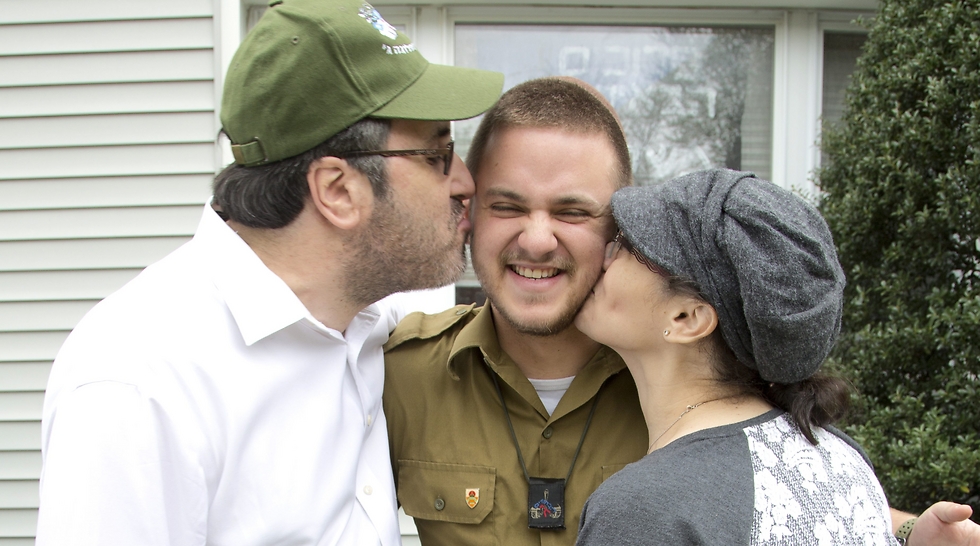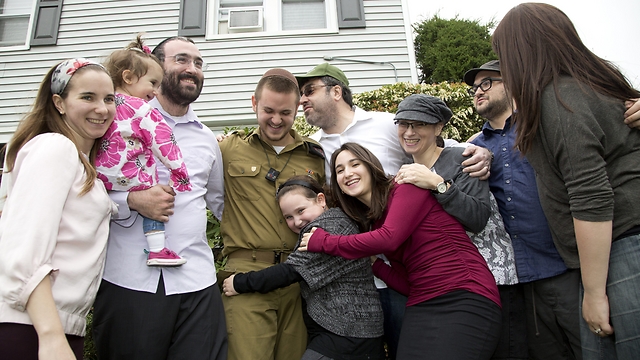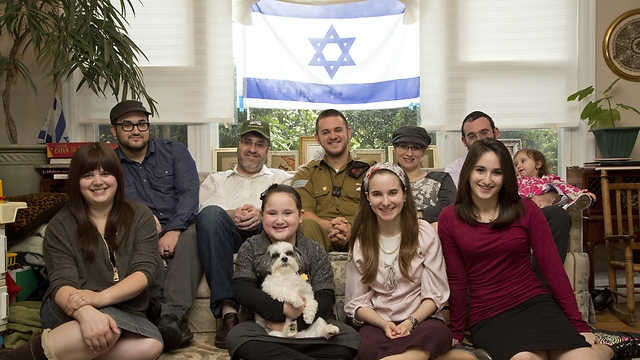Around 3,300 lone soldiers from abroad currently serve in the IDF. Most haven’t seen their families in months. Shortly ahead of Independence Day, Yedioth Ahronoth and the Friends of the Israel Defense Forces (FIDF) came up with an idea: Send four of them a trip home, and surprise their loved ones. Part 4 of 4.
Three weeks before Passover, L’via Wiesinger, a resident of New Jersey, received a phone call from her son, Yoni, who is serving in the IDF as a lone soldier. “Mom,” he told her, “Don’t be sad, but I’m not coming for the Passover seder this year.”
When speaking to her son she tried to be a hero, but when the call was over she poured her heart out on the Facebook page “Mothers of Chayalim Bodedim (Lone Soldiers)”, a secret group where mothers share their stories, feelings, pride and fears. “Vent: Yoni just started his 3rd year of service,” she wrote. “He’s supposed to get one month off in the US per year as a lone soldier. He asked several months ago for a month to come home for Pesach and was just denied all of it. I miss my kid, he has not been home for Pesach in 7 years…anyway, he’s where he is needed most. And that’s a blessing for us all. Ok, I’m done with my rant.”
Comforting responses soon followed in the thread. “Sorry. Thinking about you,” “That’s rotten,” “It sure is frustrating, know you are not alone”, and more. One even suggested, “Maybe you could take this matter higher up in the army?”.

All the while, L’via did not know that a small top-secret operation was being carried out behind her back. And so it was that two and half weeks later, three days before the Seder, Sgt. Yoni Weisinger and I, an Israeli journalist, hid in the bushes of a house in the township of Teaneck, New Jersey. It was 7:30am, and to make sure that the family members would be awake and dressed, the family’s rabbi called earlier and asked to come with his son for an “emergency lice check”. It turns out that L’via, among other things, is a professional lice specialist. In retrospect L’via would say that she couldn’t understand why the child couldn’t be checked at school, but when the rabbi makes a request like that, one obliges. And for the esteemed rabbi’s visit, not being just any frazzled mom early in the morning, L’via made sure that she was fully dressed. And just then, we banged on the door.
It’s Yoni
“I think my mother will be shocked when she sees me. It’s going to be funny. Maybe she and my sisters will cry from emotion,” Yoni projected before the meeting. His mother L’via, still tired from the late night Passover cleaning the night before, opened the door. Standing in front of her was her son Yoni, a tank loader in the Armored Corps of the IDF, in full uniform.
There was a long moment of silence. L’via hid her face in her hands, full of emotion, and then opened her hands as if to check if she was dreaming, if it was really real, really her son. Then a scream was heard: “It’s Yoni!” The scream shook the house and her 8-year-old daughter Batya came running, screaming excitedly, followed by Yoni’s father Charlie and sister Tali, 18, still in her pajamas, along with the family dog, Cupcake. All were in complete shock as they ran to hug Yoni.
Seven years had passed since Yonatan left the house in New Jersey and moved to Israel. He was then 15, a boy who from a young age dressed up as an Israeli soldier every chance he got, and the only difference from one Purim costume to another year’s costume was the division: one year Paratroopers, next Golani. Surprisingly, he never thought about the Armored Corps.
And there was another significant milestone along the way. At the age of four, he received, along with all the other children in his class, a mission: to find out the meaning of his name. “Mom said that when she was nine years old, Operation Thunderbolt took place, in which Lt. Col. Yoni Netanyahu was killed. She decided then that her son would be named after him and never forgot her intention. My older brothers, 25-year-old twins, were called Zev and Akiva out of family obligations and so it was that I was granted the privilege to be named Yoni. From the moment I heard about it, I started reading all the books and watching all the movies about the operation and Yoni Netanyahu, and I was hooked. From that moment on, I dreamed of becoming an Israeli soldier.”

As long as his admiration for Netanyahu was expressed by book reading, it was okay by Charlie and L’via Weisinger—he’s in advertising and marketing, and she’s a registered nurse and professional baker. But when Yoni announced at the age of 14 that he planned to make aliyah, to attend high school in Israel and then to be a soldier, that was a different story.
“I wanted to go to Israel before high school. My parents refused, and I rebelled that whole year of ninth grade,” he recalls. “In the end, they caved in and said, ‘Okay, you win’. Thinking about it now, I think my parents demonstrated extraordinary sacrifice, sending their son alone to a foreign place at a very young age—it’s not that simple.”
When he immigrated in 2009, Yoni came to live in the town of Hashmonaim, near Modi’in, many of whose residents are American olim. His housing arrangements became complicated and for the first four years he went from living with one family to another and another before finally settling down. Three years ago he was taken in by the Roth family, Israelis who have “adopted” him as one of their own. The family is composed of Tamar, Amir and their five children. The connection was made through Shlomi, Yoni’s classmate and close friend, who currently serves as an officer in the Nahal Brigade.
“I asked Shlomi if it was possible for me to stay with them until I worked things out,” Yoni recounts, “and he said ‘with pleasure’. After a while they said to me, ‘This is your room. Stay as long as you have to and as long as you like.’ And I’ve been there since then, and I am so thankful to them for opening their hearts and their home to me.”
At the wedding of her eldest son, Tamar insisted that Yoni be a part of the family photos. “At first I had no contact with Yoni’s parents,” Tamar told me when I met Yoni at their home, a bit before we left for the US. “Today we are in a WhatsApp group and I keep them updated. Moreover, I take the liberties of a mother. Once I even called his commander because I was worried about him.”
Yoni smiled, thanking God that his biological mother is in a different time zone. “My mother asked me 17 times for my commander’s number, and I didn’t give it to her. A mom doesn’t need the commander’s number,” Yoni quips.
When it was time to enlist, Yoni wanted to be in an elite commando unit. But he was sick on the first day of the trial period for elite units, and the second day was the day of his brother’s wedding. In the end, he enlisted in the 401st Armored Division. “I did not want to be in the armored division,” he says, “I wanted infantry, and I tried to get out of there. In the end I realized that the army has its own strategies for deciding who goes where. Today I am completely happy with my choice and tell everyone that the armored division is often more ‘combat’ than any other. To be in the armored division one needs a lot of motivation, which lone soldiers have tons of. A lone soldier is faced with many difficulties, so what is it for him to clean tank tracks and wheels all night long?”
‘She didn’t sleep at night’
Back at home in New Jersey, Yoni’s patriotism looks like a family affair. His company’s flag, which his mother got as a gift from her son’s fellow soldiers on her last visit to Israel, is hanging from the house window facing the side street. In another big window, there is a huge Israeli flag facing the main street. And when talking about his unit, Yoni pauses for a moment, rushes into his room and takes out of a bag of hats which reads “The Boys of Company “. His parents and his sister Batya rush to put on the hats.

Three months after he joined the IDF, Operation Protective Edge broke out. “At that time I purposely didn’t speak to my parents,” Yoni recalls. “I would update them via Whatsapp that everything was fine, and I told my mother that I was much farther from where I really was and that everything was OK. I focused on telling her about the donations from around the world given to the soldiers and how much they meant to us, and I made sure to send pictures in which we were laughing. I was actually in military assembly areas where lots of soldiers were killed.”
“In my heart, I knew it was worse than what he told me. I did not sleep well at night, I prayed a lot,” Yoni hears from his mom for the first time. “When I gave my son the name Yoni in memory of Yoni Netanyahu, it was out of great pride. But after my son was drafted, it hit me: What the heck was I thinking when I named him after an officer who was killed in combat? I’m raising him to be a soldier and as dedicated as Yoni, all the while praying that he would not be exactly like him, that he would live a long life and not die a hero. I’m proud of my son’s choice, but do I sleep well at night? No. So, sometimes I just have to close my eyes and not think about it. Every time there is an attack, no matter where, I cry and worry. He usually sends a text message saying ‘I’m okay’ even if I still have not heard about the attack on the news.”
“Today it’s a lot easier with Skype and Facebook and all the social networks,” says Yoni, “but the lack of a mother’s embrace is impossible to fill. Even that I had to get used to in the end.”
Teaneck, New Jersey, is home to many Jewish families, and in the well-kept suburb of New York City there are many Jewish public institutions. On the way to the Weisinger family home, we pass by rows of beautiful homes. Most are made of wood or brick, two stories high, and have nice-sized gardens in front and back. This is the type of home that Yoni left behind for Israel. Not a place one rushes to leave.
“There are two attitudes Israelis have towards lone soldiers,” says Yoni. “The first is ‘Way to go!’ The second is “Idiot, what brought you here?!'” In the end the conversation always ends with, ‘It’s great you came; you’re now a part of us’. I told all the guys that after their service, on their way to South America, they should pass by my folks, I’m sure my mom would be more than happy to have them over.”
And you?
“I’ll do my after-army travels in Israel. Everyone dreams of going abroad, but I’m good here. After such an effort to get to Israel, now I’m going to run away?”
L’via takes me by the hand to tour the second floor, to Yoni’s room which has remained exactly the way it was when he left at the age of 15, with pictures of Israeli aircraft on the walls, camouflage netting over the bed and a large framed picture of Israeli soldiers at the Western Wall with the prayer for the soldiers superimposed upon it. Then we sit down for a family conversation. “Do you have a girlfriend?” Batya questions her older brother. “No,” he blushes. “Why not?” his mom asks. “I’ll get one, God willing,” Yoni replies.
“So, what CDs did you bring us from Israel?” Yoni smiles with relief and pulls out Shlomi Shabbat, Shlomo Artzi, and suddenly, out of nowhere, the so-American living room is full of Mediterranean sounds.
“What do you plan to do on this vacation?” I asked him while we were still in Israel, and I was expecting to hear the standard answer: clubs, entertainment, friends. “To be with family, to be normal,” Yoni says sincerely. “To get up in the morning, eat breakfast together, lunch, do stuff with the family. I’m not looking for special experiences; I just want to be relaxed with mom and dad and my brothers and sisters.”
But L’via has other plans for her son. “Until Friday, the eve of Passover, he will help me in the kitchen,” she points out. “You don’t scare me,” he responds. “Going from cleaning MAGs to cleaning dishes isn’t bad at all.”
This story’s quotations were translated from the Hebrew text that originally appeared in Ynet’s sister publication, Yedioth Ahronoth.
A word on FIDF
Some 6,700 lone soldiers serve in the Israel Defense Forces today. Close to half of them come from outside of Israel hailing from more than 60 countries around the world. One of the flagship programs of Friends of the Israel Defense Forces (FIDF) supports these soldiers. In 2015, according to FIDF figures, the organization supported 2,665 lone soldiers, 1,385 of whom received plane tickets to visit their families courtesy of the organization.
FIDF is an American non-profit organization which raises funds to support IDF soldiers and their families through educational, cultural, economic and social programs. It currently has more than 150,000 donors and 16 regional offices in the United States and in Panama. In 2015, the FIDF raised $101.4 million for these programs supporting IDF soldiers.
“These young girls and boys from all over the world, imbued with belief and a sense of mission, to leave their homes and families overseas and join the ranks of the IDF, choose to do something brave and noble to take part in the continued effort to defend the citizens of Israel and world Jewry,” says FIDF National Director and CEO Maj. Gen. (res.) Meir Klif Amir. “I see these lone soldiers as a source of inspiration, of pride and of hope for us all. FIDF aims to be an adoptive family for the lone soldiers in the IDF and to make sure that they will never, ever feel alone.”
As reported by Ynetnews
